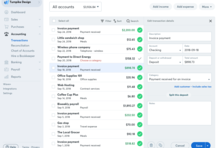Accounting software helps businesses record how much money goes in and out of the company. It is an automated system that helps identify where an organization stands in terms of financial health.
Generally, accounting software helps businesses stay on top of their finances—they know when, how, and where their money is moving.
Accounting software systems designed to provide basic bookkeeping functions exist alongside those that are intended for big and established businesses that need to track their finances. Whichever of the two is used, they can significantly help improve business finance efficiency and prevent accounting personnel from committing mistakes.

 Wave is a completely free solution offering accounting and invoicing capabilities with no catches like trials, limitations, or hidden fees.
Wave is a completely free solution offering accounting and invoicing capabilities with no catches like trials, limitations, or hidden fees.
Accounting software streamlines the business financial process. It performs major accounting tasks that are crucial for the success of a business. While these tasks can be done using spreadsheets or any manual bookkeeping systems, doing so will only slow down the process and increase the possibility of inaccuracies.
Businesses that use accounting software know that the automated system is more reliable, accurate, and efficient. The only time the software can make a mistake is when the person using the system makes an error.
Using an automated accounting system is the ideal choice for organizations that want a time-efficient way of storing financial information such as accounts payable, accounts receivable, billing/invoicing, inventory, and orders. Basically, accounting or finance departments will find it easier to track the company’s cash flow and determine what needs to be paid (costs) and who owes the business, as well as keep track of (and manage) sales tax.
Accounting software is packed with features that help finance departments effectively and efficiently monitor and manage the overall health of businesses.
Accounting software has the most important accounting features that allow businesses to record and manage the way money is used or moved. These functionalities include:
Accounts Receivable or A/R – Proper invoicing provides businesses with information such as who owes the company money, how much is owed, and when it is expected to be paid. An invoice includes details like customer name, address, and account information. Ideally, accounting software either prints or emails invoices.
Some accounting software has automatic invoices. Statements and reminders are automatically sent so businesses won’t have to deal with manual collection problems.
There are also software solutions that offer electronic payment processing features. This is convenient not only for the customers or clients but also for the company’s personnel. The entire process is automated so there’ll be no more need to run to the bank to deposit payments.
Accounts Payable or A/P – This is what helps organizations track the flow of cash going out. One of the main A/P functions is the tracking and management of purchase orders. This is where all purchases, regardless of number and amount, are listed. The Cloudbooks app offers an expenses tracking solution that can make it easier for businesses to take note of their spending.
Businesses can also take advantage of the automatic payment feature to prevent problems like missed or late payments. This feature often allows bank payments to be scheduled and, likewise, gives users the option to directly deposit payments.
The A/P feature is also ideal for monitoring and tracking vendor credit. Its most important feature though is the tax forms database, which means businesses no longer have to waste time procuring the forms they need. An added advantage is its ability to electronically fill up and file the form as well as pay the Inland Revenue Service (IRS) on time.
Accounting software that offers links to and integration with banks and users’ bank accounts are in demand because keeping track of all accounts, facilitating and managing deposits, and handling checks becomes more convenient. The one that performs general ledger tasks is ideal for businesses.
Free accounting software such as Wave integrates an unlimited number of bank accounts and credit cards through a simple process. Manager.io, on the other hand, has a general ledger feature aside from offering bank reconciliation.
Accounting systems also perform inventory-related functions such as monitoring and setting inventory levels. This helps businesses make sure there is more than enough stock and orders can be carried out as scheduled.
In addition, this particular feature allows the parties concerned to visually identify mistakes and make sure the orders are correct. As such, businesses can easily ensure the right items are shipped.
The category of reports accounting systems provided varies. There are some that come only with the most basic (cash in and cash out), while there are others that come with more detailed reports. Aside from the standard cash flow, assets, liabilities, profit, loss, accounts receivable and payable, some accounting software can also generate customized reports, subsidiary reports, graphs, and financial forecasts (i.e. costing tasks like estimating and budgeting).
Accounting systems are for all types of businesses, even for those that do online retailing. The software’s shipping feature does not only help determine shipping costs, but it also allows companies to track shipments. An added bonus is the printing of invoices, orders, and shipping labels.
Accounting software provides businesses with a simple payroll module that can be used for different compensation types and payroll schedules. It can even be used for determining benefits and ensuring all employees (who qualify) enjoy them.
To further make the payroll process more efficient and convenient; an automated deposit system is in place for most accounting software. Businesses can choose to deposit payments directly into the recipient account.
Some accounting systems also offer automated tax deduction functions but the scope can vary from one software to another. There are some that offer only the basic ones and then there are those that provide automatic calculations for even the most complicated tax types. Also, systems that help with deductions and reimbursements of expenses (such as food, entertainment, and travel) are also available.
In terms of monitoring time and attendance of employees, businesses can easily track when an employee clocks in and out (which is essential for an efficient payroll process). Tracking tasks or jobs is also part of this feature. It will then be easy to monitor the status—including the amount of work done and still to be done—of a particular task or job.
Accounting software, even the free ones, streamline the accounting and finance process. It simplifies the whole accounting operations without anybody having to accumulate additional expenses or bring in a third party.
As such, it follows that business finances improve as there is now better control of expenses. Aside from reducing costs for accounting processes, using the software also means minimized-to-no spending on manual tasks such as document printing.
Another accounting software benefit businesses can take advantage of is reliable forecasting. The system allows a company to identify and understand the expenses that matter and the ones that are non-essential. This is a crucial factor in formulating strategies, managing resources, and coming up with informed decisions.
Improved efficiency, financial transparency, and productivity are important accounting software benefits. The automated system encourages a more efficient way of delivering finance tasks, so human error is significantly reduced, especially in terms of schedules, reports, and calculations.
Since everything is entered into the system, transparency won’t be a problem anymore. It will be easy to see where the money is coming from and where it is going. This is important if a business wants to ensure its financial stability and success.
An automated accounting system encourages productivity because it presents a convenient, streamlined, and efficient solution for carrying out daily accounting and finance tasks, including handling sensitive data.
The simplified, more efficient process results in a billing and invoicing system that benefits customers. There will no longer be room for inaccuracies, delays, miscommunication, and other similar problems. Some accounting software systems also allow businesses to customize or personalize their billing and invoicing processes according to the preference of their customers. This contributes to a healthier and happier relationship with customers.
Another benefit is improved security. Each accounting system allows users to personalize countermeasures, so only a chosen population or number of employees will be able to access data kept by the software. In case something happens to the system—it crashes or is hacked—businesses can choose to easily retrieve their most sensitive data because they kept a copy of it.
Perhaps the most important benefit of accounting software (aside from managing cash flow) is tax compliance. The system strictly follows tax regulations and is also a repository of valuable information about tax and audit. With a good accounting system in place, adhering to IRS policies and requirements will never be a problem for businesses.
All these benefits and the features that come with them are available in paid accounting software. However, quite a lot of free accounting software comes with the majority of the benefits offered by their paid alternatives.
Wave, for example, is web-based accounting software that comes with a long list of features, including cloud back-up. It is free and will forever be free. Cloudbooks, on the other hand, has a free version that allows unlimited users and provides cloud storage. Then there’s Manager, which has a free to download software with comprehensive accounting features.
Using free accounting software is an ideal option for companies and organizations that want to transition from the tedious manual accounting process to a streamlined, automated, and more accurate system. Accounting software helps businesses better record, track, and manage day-to-day finance-related transactions.
With a better, more convenient, and free accounting system, business leaders and personnel will be encouraged to give their best, thereby ensuring improved efficiency and productivity. As a result, businesses, regardless of size or industry, will have more time to focus on other equally important aspects that can help determine its financial stability and health—and its success.